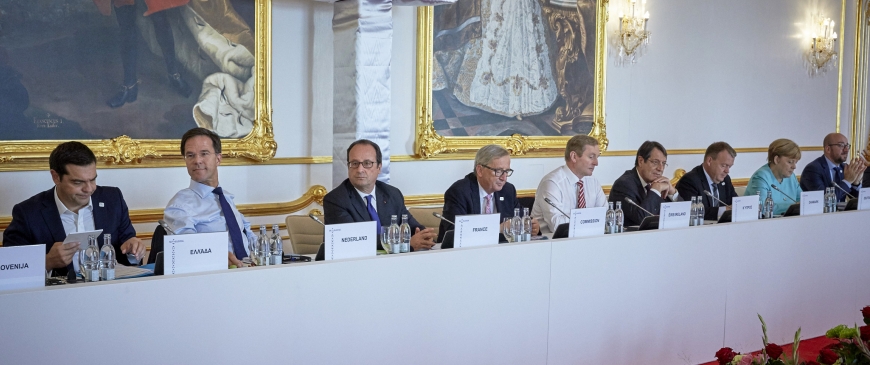
Minus Britain, the EU brainstorms in Bratislava
As Brussels and European Union capitals get back into their political rhythm again after the summer break, the EU meeting in Bratislava on Friday 16 September is set to be anything but business as usual.
For one thing, Theresa May, United Kingdom Prime Minister and officially still part of the EU club, has not been invited (which is why EU jargon refers to the talks as an informal meeting rather than a formal meeting of the European Council).
But EU leaders cannot afford to spend too much time on the British. Bratislava takes place at a time of unprecedented popular scepticism towards the EU, with populist parties in most member-states questioning the Union’s raison d'être.
Donald Tusk, President of the European Council, has convened Friday’s meetings with these trends in mind, warning national representatives that ‘ordinary people …do not share our Euro-enthusiasm’, urging leaders to pause and reflect, and to take the concerns of their citizens seriously. He is right to do so. Against the background of the migration crisis and multiple terrorist attacks on European soil, many voters have lost faith in the basic capacity of the EU to control its borders, and to guarantee the security of its citizens.
A plethora of proposals to strengthen EU defence co-operation have been released in the days and weeks leading up to the Bratislava meeting. Many are sensible, if not necessarily new. As the EU is engaged in multiple military missions – from fighting people-smuggling in the Mediterranean Sea, to a training mission in Mali and counter-piracy operations off the Horn of Africa – each with its own national temporary command centre, a (modest) permanent military headquarters would be a more efficient way of running them all. And few would question the merits of streamlining defence procurement mechanisms between European member-states. Some of these ideas have gained momentum because of the prospect that Britain will soon be unable to veto them; others may appear to leaders a convenient way to demonstrate unity. All of them risk oblivion if they are not followed up with tangible increased investments and an EU strategy for tackling the conflicts to its south.
This Friday in Bratislava, defence cooperation plans may offer an opportunity for the EU-27 to ascertain the union’s legitimacy as a security guarantor. But they are unlikely to distract from the disagreements that still exist over many of the EU’s remaining fundamental challenges.
Devising a coherent economic policy continues to be one such challenge. Germany’s Chancellor Angela Merkel, well aware that she has a reputation for growing her own country’s economy at the expense of allies, wants to revive the European social compact. She plans to discuss youth employment schemes, and ways to increase the EU’s global competitiveness. But she is unlikely to win over the leaders of those southern member-states who gathered last week for a ‘Mediterranean Summit’ to rail against fiscal austerity and a ‘German union’.
Other long-standing divisions have also come to the surface again in the weeks preceding the Bratislava meeting. The row between the EU institutions and Poland’s governing Law and Justice Party over changes to the country’s constitutional court and other reforms undermining the rule of law is ongoing. In the debate over the treatment of immigrants and refugees, Luxembourg’s foreign minister has called for Hungary to be expelled from the EU. And the four Central European Visegrad group governments are reportedly plotting to demand broad power shifts from Brussels to national capitals during the Bratislava meeting - something which would inevitably require treaty revision.
For the British themselves, Bratislava will be a first potent demonstration that they will have to invest in creating a strong European network to enable them to lobby for British interests outside the negotiating room. From potential reforms to freedom of movement to the evolving relationship between NATO and EU defence – both topics of crucial relevance for Britain – the UK will be watching from the sidelines.
Friday’s meetings can be thought of as the beginning of a brainstorming process over the EU’s future. Bratislava will probably not produce any concrete results; member-states can hope at most to demonstrate unity and a spirit of renewal.
Brussels has set itself an unofficial deadline of completing the thinking phase by the time the EU celebrates the 60th anniversary of the Treaty of Rome next spring. By that time, EU leaders will have to move past promises and deliver something their citizens can believe in.
Sophia Besch is a research fellow at the Centre for European Reform. Her article, ‘Brexit: What have we learned so far?’, co-authored with James Black, will appear in the October–November issue of Survival.
